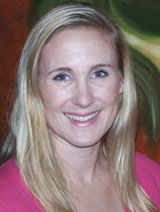Volume 28 · Number 3 · Spring 2011
Major Muses
Math and science professors help a daydreaming biology student find another side to UC Davis — and herself — in the humanities.
My mother was a database operator for the city of San Diego, and my father dreamed of running a farm in Nebraska. My high school Advanced Placement science classes thrilled me, and I wanted to be either a pediatrician or a veterinarian. Could UC Davis ask for a better groomed or more eager undergraduate, ready to embrace the university's vast resources of scientific knowledge? No!
Well, it turns out, yes, UC Davis could. Three weeks into my prerequisite biology and chemistry classes, I realized I had no idea what I was doing. While my peers sailed through notes on covalent bonds and cell structures, I doodled intricate scenes of forest nymphs and invented new words to describe all things ethereal. My roommate, who also planned to major in biology, kept stacks of note cards in a constant rotation of memorization and study. I committed my time to reading Diamante and Bulfinch (among other off-task activities). My grades began to slip and the impending end of the quarter shook me into a panic. What was my problem? How could I be so close to failing? What was I going to do?
With the help of some very patient and wise professors, I came to realize that the usual host of reasons any freshman does anything (because it sounds good, your parents think it is a good or bad idea, everyone else is doing it too) did not motivate me. Reflection and self-knowledge, however, did. The trouble was that, at 18 years old, I thought organic chemistry was more possible than meaningful reflection. Science seemed important and immediately relevant to people's lives, and I wanted to be important and relevant to people, too, so I had chosen a biology major. But daydreaming through class devalued both those desires; it also killed my GPA. I decided reflection and tapping into my passion would have to wait. Hard work needed to happen now.
With new zeal and dedication, I cracked books, took notes, wrote note cards, attended study sessions, stalked professors during office hours and camped in the library. Determined to succeed, I sweated through all the reading and caught up from a huge deficit, and afterward crowned myself the Comeback Kid of Introductory Biology. By the end of my first quarter as an undergraduate, I managed passing grades (and even a few Bs!) in all my classes. Hooray.
And yet my survival was a disappointingly empty victory. Though I now had some clarity about my problem, a new quarter loomed and I had no solutions. My great passion still eluded me and self-reflection was too painful. So I looked for someone trustworthy to tell me what to do. My dormmates were no help — they were only slightly less confused than I was. In one of my most intelligent decisions as an undergrad, I turned to my professors. At the suggestion of an understanding calculus professor (who took one look at my notes and quickly proclaimed them more sketch-pad-meets-journal than math notes), I enrolled in a Greek mythology class for my second quarter at UC Davis.
I loved Greek mythology. I wrote down every word my professor uttered, feverishly scribbled modern-day connections in the margins of my books, penned lists and lists of questions, attempting to connect the classic tragic heroes to modern celebrities, and ancient battles to teenage angst. The passionate love, violent ends, tragic calamities, heroic sacrifices and outright humanity made me tingle. My light bulb turned on.
Greek mythology led to a philosophy class, which led to a beginning drawing class, which lead to a writing class, which led to an American literature class, and so on. Ever-forgiving, UC Davis revealed to me a gem of an English department, a roiling and passionate political science department and a bursting art department. Eventually, I chose English as my major with an education emphasis. Who knew? Weren't all Aggies engineering, animal science or biology majors? Apparently, only unreflective freshmen think that.
Though I may never learn the intricacies of electrophoresis or prove infinity, my science and math compatriots did teach me to follow my own lead. Perhaps allowing ourselves to be both passionate and reflective is what it means to be important and relevant, regardless of your specialty.

Dorothy Carlson '01 traveled the world after college and now teaches literature at Westview High School in San Diego. She can be reached at dcarlson@powayusd.com.
